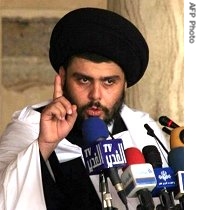2007年VOA标准英语-Moqtada al-Sadr Reemerges in Public, Mahdi Army(在线收听)
Irbil
25 May 2007
Shi'ite cleric Moqtada al-Sadr has made his first public appearance since the Baghdad security crackdown began in February, again demanding the withdrawal of U.S. forces from Iraq. The leader of the powerful Mahdi Army called for the militia to stop fighting Iraqi security forces, and he asked Sunni Arabs to join him in an alliance against the American military presence. VOA's Barry Newhouse reports from Irbil that his speech came on the same day that the Mahdi Army commander in Basra was reported killed.
The British military said Abu Qader, commander of the powerful Mahdi Army militia in the Shi'ite city Basra was killed by Iraqi forces after resisting arrest.
A British military spokesman told the Reuters new agency the operation was authorized by the Iraqi government.
 |
| Shi'ite cleric Moqtada al-Sadr speaks to supporters at Friday prayers at his local mosque in Kufa, central Iraq, 25 May 2007 |
He says he knows who is behind this, it is the occupation. He says the occupation is behind the violence so they can stay longer in Iraq. He tells worshippers not to contribute to the reason the occupation forces are staying.
Al-Sadr has been a longtime opponent of U.S. forces in Iraq, and lawmakers in Iraq's parliament who are loyal to him have consistently lobbied the government to set a timetable for a U.S. withdrawal. His Shi'ite militia also has fought battles with U.S. and Iraqi forces in the past. On Friday the cleric said he is forbidding such fighting between militia members and Iraqi security forces.
Al-Sadr also said sectarian divisions between Sunnis and Shi'ites have weakened the country. He said the two sides must reconcile so Iraq can become independent and free.
He says he is ready to cooperate with Sunnis. His hand is open to them.
The U.S. military says Moqtada al-Sadr left for Iran after the U.S.-led Baghdad crackdown began in February. His followers say he never left Iraq. But the cleric has not been seen since his Mahdi Army militia went underground ahead of the Baghdad security operation.
Al-Sadr's militia is routinely accused of sectarian killings and torture, but his forces have at times brought some stability and security to predominantly Shi'ite areas of Baghdad and cities in the south of the country.
The cleric on Friday called on all Iraqis to demonstrate, demanding a U.S. withdrawal.
Speaking to reporters today from Baghdad, U.S. Army Colonel Ricky Gibbs, in Baghdad for the security operation, said he expects demonstrations against the American troop presence. But he rejected an immediate withdrawal.
Gibbs says when he walks the streets of Baghdad's religiously mixed al-Rashid neighborhood, residents say U.S. forces are still needed.
"When I ask them the question, do you want the Americans to stay here in Iraq, they say yes, you cannot leave us now," said Gibbs. "Without you as the honest broker, then we are in trouble."
Also Friday, the U.S. military announced the deaths of six more American soldiers, bringing the total number killed in May to 90. This month is on track to be one of the deadliest for U.S. forces in years. Since the 2003 invasion, almost 3,500 U.S. troops have died in Iraq.